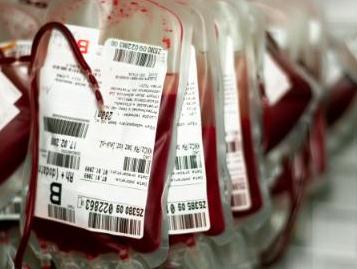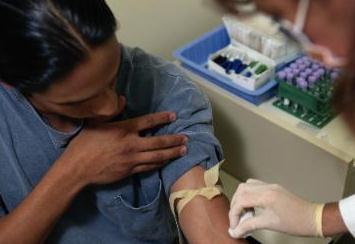
"I would have liked to see Canada lead the way as a human rights issue. But this is one they've failed on once again," says activist Nancy Campana. Credit: Thinkstock

"Our community should feel empowered knowing we forced CBS [Canadian Blood Services] to even talk about changing this policy, says Rebecca Rose. Credit: Thinkstock
Blood. It’s in you to give, as long as you’re not a man who’s had sex with another man in the last five years.
Health Canada announced a long-awaited policy change May 22, ending the lifetime ban on men who have had sex with men (MSM) even once since 1977 and replacing it with a ban on donations from men who have had sex with another man in the last five years. The new policy takes effect July 22.
Queer activists have long pushed for an overturn of the lifetime ban – enacted during the height of the AIDS crisis and before reliable testing for HIV was available – arguing that it discriminates against and stigmatizes gay men. But activists are already complaining that the new five-year deferral policy continues to discriminate arbitrarily, given that current tests can detect HIV in the blood two weeks after an infection and that other jurisdictions have considerably shorter deferral windows for men who have sex with men.
“A five-year deferral period for MSM is no less discriminatory than an indefinite deferral,” says Ãgale Canada executive director Helen Kennedy. “It’s time to acknowledge that a person’s identity doesn’t put them at any greater risk for a sexually transmitted disease; rather, it is their behaviour that determines their risk.”
Health Canada says it considered the science and risk factors and has enacted the change at the request of Canadian Blood Services and Héma-Québec, the two organizations that are responsible for collecting blood in Canada.
Blood collection agencies can’t simply rely on the testing done on collected blood, because no test is “100 percent accurate,” says Robert Cushman, a senior medical advisor at Health Canada.
“The science indicates that we can move to a five-year window because it would not affect the safety of the blood supply,” Cushman says. “Approximately half of new HIV cases in Canada are MSM. Seventy-five percent of the males who are newly diagnosed with HIV are MSM. This is a risk behaviour, not a sexual orientation policy.”
But for Nancy Campana, an activist who started up the website allhealthycanadiansshouldbeabletodonate.com, Health Canada’s announcement is “disappointing.”
Campana began her campaign last year when her recently deceased son Rocky’s organ donation was refused. She says she thought Health Canada would at least match its blood policy to its organ policy, which allows MSM to donate if they have been in a monogamous relationship for at least five years, or match the deferral periods of other jurisdictions, like the UK and Australia, which allow donations from MSM who have not had sex with a man in the last year.
“I would have liked to see Canada lead the way as a human rights issue. But this is one they’ve failed on once again,” Campana says.
“I would have loved to see it meet Italy’s standard [a four-month deferral], but not just for the MSM population, but for the entire population. If anyone’s had more than one partner in four months they should be treated the same,” she says.
But Cushman says that Canada’s different safety standard for men who have sex with men and injection drug users is based on scientific assessment of the risk of gay men’s blood.
“It would be equally unfair to make this blood available knowing what we do about the risk factors,” Cushman says.
“MSM is a risky behaviour. There’s anatomical reasons. There’s a scientific explanation. I think it would be remiss on our part not to concentrate on the two risk factors that have the lion’s share of the burden of illness in the blood supply.”
Cushman disagrees that promiscuous heterosexuals who engage in anal or vaginal sex without condoms present an equal or greater risk than monogamous MSM who always use condoms, citing figures showing that HIV is much more common in the MSM population than in the general population.
Cushman says he expects the new policy to increase blood donations but could not estimate how many new donors would qualify given the criterion that MSM must not have had sex with another man in the last five years.
“We recognize this is a preliminary step. I suspect that testing is going to get more sophisticated,” Cushman says, although he did not speculate when further changes would be considered.
For Rebecca Rose, a queer activist who worked on the Canadian Federation of Students’ End the Ban campaign until recently, the fight must continue.
“Our community should feel empowered knowing we forced CBS [Canadian Blood Services] to even talk about changing this policy, and we shouldn’t let them look like they did this out of the goodness of their hearts when it took years of public pressure and collective action. We need to speak out on this decision (and counter the idea that this is better than a ban) and keep pressure on CBS to have a behaviour based policy, full stop,” she wrote on her Facebook wall.


 Why you can trust Xtra
Why you can trust Xtra


